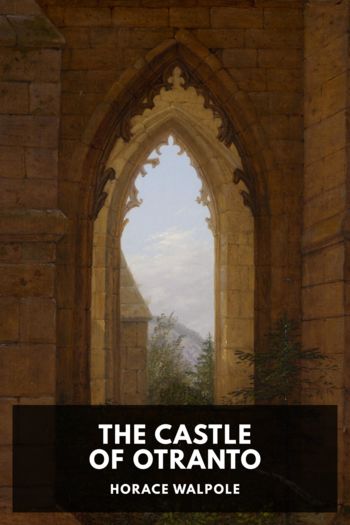The Castle of Otranto - Horace Walpole (superbooks4u .TXT) 📗

- Author: Horace Walpole
Book online «The Castle of Otranto - Horace Walpole (superbooks4u .TXT) 📗». Author Horace Walpole
“Reverend Father, I sought the Lady Hippolita.”
“Hippolita!” replied a hollow voice; “camest thou to this castle to seek Hippolita?” and then the figure, turning slowly round, discovered to Frederic the fleshless jaws and empty sockets of a skeleton, wrapt in a hermit’s cowl.
“Angels of grace protect me!” cried Frederic, recoiling.
“Deserve their protection!” said the Spectre. Frederic, falling on his knees, adjured the phantom to take pity on him.
“Dost thou not remember me?” said the apparition. “Remember the wood of Joppa!”
“Art thou that holy hermit?” cried Frederic, trembling. “Can I do aught for thy eternal peace?”
“Wast thou delivered from bondage,” said the spectre, “to pursue carnal delights? Hast thou forgotten the buried sabre, and the behest of Heaven engraven on it?”
“I have not, I have not,” said Frederic; “but say, blest spirit, what is thy errand to me? What remains to be done?”
“To forget Matilda!” said the apparition; and vanished.
Frederic’s blood froze in his veins. For some minutes he remained motionless. Then falling prostrate on his face before the altar, he besought the intercession of every saint for pardon. A flood of tears succeeded to this transport; and the image of the beauteous Matilda rushing in spite of him on his thoughts, he lay on the ground in a conflict of penitence and passion. Ere he could recover from this agony of his spirits, the Princess Hippolita with a taper in her hand entered the oratory alone. Seeing a man without motion on the floor, she gave a shriek, concluding him dead. Her fright brought Frederic to himself. Rising suddenly, his face bedewed with tears, he would have rushed from her presence; but Hippolita stopping him, conjured him in the most plaintive accents to explain the cause of his disorder, and by what strange chance she had found him there in that posture.
“Ah, virtuous Princess!” said the Marquis, penetrated with grief, and stopped.
“For the love of Heaven, my Lord,” said Hippolita, “disclose the cause of this transport! What mean these doleful sounds, this alarming exclamation on my name? What woes has heaven still in store for the wretched Hippolita? Yet silent! By every pitying angel, I adjure thee, noble Prince,” continued she, falling at his feet, “to disclose the purport of what lies at thy heart. I see thou feelest for me; thou feelest the sharp pangs that thou inflictest—speak, for pity! Does aught thou knowest concern my child?”
“I cannot speak,” cried Frederic, bursting from her. “Oh, Matilda!”
Quitting the Princess thus abruptly, he hastened to his own apartment. At the door of it he was accosted by Manfred, who flushed by wine and love had come to seek him, and to propose to waste some hours of the night in music and revelling. Frederic, offended at an invitation so dissonant from the mood of his soul, pushed him rudely aside, and entering his chamber, flung the door intemperately against Manfred, and bolted it inwards. The haughty Prince, enraged at this unaccountable behaviour, withdrew in a frame of mind capable of the most fatal excesses. As he crossed the court, he was met by the domestic whom he had planted at the convent as a spy on Jerome and Theodore. This man, almost breathless with the haste he had made, informed his Lord that Theodore, and some lady from the castle were, at that instant, in private conference at the tomb of Alfonso in St. Nicholas’s church. He had dogged Theodore thither, but the gloominess of the night had prevented his discovering who the woman was.
Manfred, whose spirits were inflamed, and whom Isabella had driven from her on his urging his passion with too little reserve, did not doubt but the inquietude she had expressed had been occasioned by her impatience to meet Theodore. Provoked by this conjecture, and enraged at her father, he hastened secretly to the great church. Gliding softly between the aisles, and guided by an imperfect gleam of moonshine that shone faintly through the illuminated windows, he stole towards the tomb of Alfonso, to which he was directed by indistinct whispers of the persons he sought. The first sounds he could distinguish were—
“Does it, alas! depend on me? Manfred will never permit our union.”
“No, this shall prevent it!” cried the tyrant, drawing his dagger, and plunging it over her shoulder into the bosom of the person that spoke.
“Ah, me, I am slain!” cried Matilda, sinking. “Good heaven, receive my soul!”
“Savage, inhuman monster, what hast thou done!” cried Theodore, rushing on him, and wrenching his dagger from him.
“Stop, stop thy impious hand!” cried Matilda; “it is my father!”
Manfred, waking as from a trance, beat his breast, twisted his hands in his locks, and endeavoured to recover his dagger from Theodore to despatch himself. Theodore, scarce less distracted, and only mastering the transports of his grief to assist Matilda, had now by his cries drawn some of the monks to his aid. While part of them endeavoured, in concert with the afflicted Theodore, to stop the blood of the dying Princess, the rest prevented Manfred from laying violent hands on himself.
Matilda, resigning herself patiently to her fate, acknowledged with looks of grateful love the zeal of Theodore. Yet oft as her faintness would permit her speech its way, she begged the assistants to comfort her father. Jerome, by this time, had learnt the fatal news, and reached the church. His looks seemed to reproach Theodore, but turning to Manfred, he said,
“Now, tyrant! behold the completion of woe fulfilled on thy impious and devoted head! The blood of Alfonso cried to heaven for vengeance; and heaven has permitted





Comments (0)